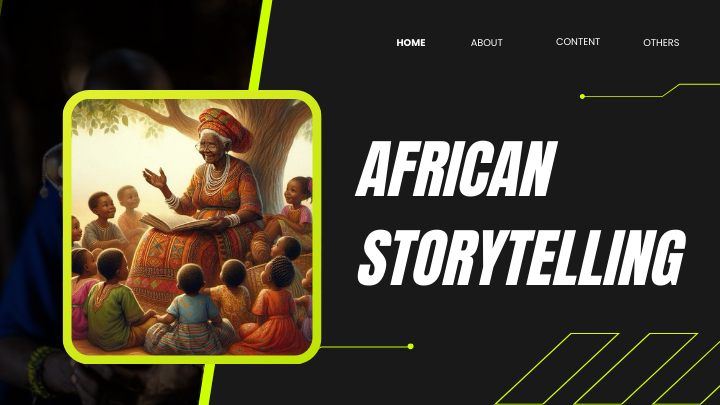African Storytelling
Storytelling is one of the most cherished and enduring traditions in African cultures. Across the vast expanse of the continent, stories have been passed down through generations, weaving together the rich history, values, and wisdom of African societies. Oral traditions, including folklore, myths, legends, and fables, have played a crucial role in shaping the identity of African communities, preserving cultural heritage, and imparting moral lessons. As African communities settle and thrive in countries like Australia, these traditions continue to be a vital part of cultural preservation, helping younger generations connect to their roots while sharing their stories with the broader community.
This article explores the importance of African storytelling, the role of folklore in preserving culture, and how these traditions are being adapted and passed down in Australia to ensure that African heritage continues to flourish.
1. The Importance of African Storytelling
For centuries, African storytelling has been an oral tradition—a way of preserving history, customs, and values in the absence of written records. In many African cultures, the Griot (or storyteller) holds a revered position within the community, acting as the keeper of historical knowledge, genealogies, and cultural tales. These stories are often performed through engaging methods like spoken word, music, dance, and dramatic expression, creating a rich sensory experience that connects the listener to the past.
African storytelling is not just about entertainment—it serves several important purposes:
- Cultural Preservation: Stories are a way of preserving and passing on cultural practices, values, beliefs, and customs. Through storytelling, younger generations learn about their ancestors’ triumphs, struggles, and traditions.
- Moral and Ethical Lessons: Many African folktales contain moral lessons about virtues such as honesty, respect, kindness, and justice. These stories are designed to teach important life lessons in an accessible and memorable way.
- Community Bonding: Storytelling brings people together, creating a sense of unity and shared identity. In traditional settings, communities gather around the fire to listen to stories, fostering social cohesion and reinforcing collective values.
- Entertainment and Education: Folklore and myths often serve as both entertainment and education. They captivate audiences with their magical and fantastical elements while simultaneously offering insights into human nature and societal norms.
2. Key Elements of African Folklore
African folklore is incredibly diverse, with each ethnic group or region having its own unique stories and themes. However, certain motifs and characters appear across various cultures:
- Anansi the Spider: One of the most famous and widely told stories in West African folklore is that of Anansi, the clever spider who is often portrayed as a trickster. Anansi’s tales teach lessons about wisdom, resourcefulness, and the consequences of greed and pride. These stories are particularly prevalent in Ghana, where Anansi is considered a cultural hero.
- The Tortoise: In many African cultures, the tortoise is a central figure in folktales. Often depicted as cunning and wise, the tortoise outwits larger, stronger animals. These stories highlight themes of intelligence over physical strength, and the tortoise's character is a symbol of resilience and strategy.
- Creation Myths: African folklore often includes creation stories that explain how the world and humanity came to be. For example, many cultures in Africa have stories about a great creator or supreme being who formed the earth, sky, and living creatures, often involving elements of nature such as the sun, moon, and animals.
- Trickster Figures: Beyond Anansi and the tortoise, many African cultures feature trickster figures—characters who outwit others through wit, cunning, and humor. These figures often highlight the importance of intellect and adaptability in overcoming challenges.
3. Storytelling as a Tool for Cultural Preservation in Australia
In Australia, African immigrants and their descendants are actively working to ensure that the rich tradition of African storytelling is passed down to younger generations. With many African families now living in Australia, these stories have become a vital tool for bridging the gap between generations and maintaining a connection to their cultural roots.
- Community Storytelling Events: Across Australian cities like Sydney, Melbourne, and Brisbane, community events and festivals celebrate African culture and storytelling. These events often feature live storytelling performances, where elders, griots, and community leaders share folktales and myths with younger audiences. These gatherings not only preserve African heritage but also provide a platform for people of all backgrounds to learn about African culture.
- African Cultural Centres: Cultural institutions such as the African Australian Multicultural Centre in Melbourne or the Africa Centre in Sydney offer educational programs that teach African folklore and storytelling. These centers host workshops, performances, and exhibitions where young African Australians can learn traditional stories in a modern setting. Some centers also feature storytelling nights where participants can share their family’s stories, encouraging intergenerational dialogue and cultural exchange.
- Digital Storytelling: As technology continues to shape the way we communicate and preserve traditions, many African Australians are turning to digital platforms to document and share their stories. Social media, podcasts, YouTube, and other digital tools are being used to create a modern version of oral storytelling. These platforms allow young African Australians to connect with their heritage in new ways while reaching global audiences interested in African culture.
- African Storytelling Workshops for Youth: Various cultural organizations in Australia offer workshops aimed at young people, where they can engage with African folklore and learn the art of storytelling. These workshops are not only about preserving the stories but also teaching the next generation the performance aspects of storytelling—using voice, body language, and expression to bring tales to life. For younger audiences, these workshops can help develop a sense of pride in their cultural identity while
- providing a creative outlet for expression.
4. Modern Adaptations of African Folklore
While traditional African storytelling remains central to preserving cultural heritage, modern adaptations have emerged in Australia and beyond. Younger generations are increasingly blending ancient stories with contemporary issues, creating new narratives that reflect their experiences as African Australians.
- Contemporary Storytelling in Literature and Film: African Australian writers, filmmakers, and artists have adapted traditional folktales into modern literary works and films. These adaptations allow African Australians to reinterpret ancient stories within a contemporary context, addressing issues such as migration, identity, and cultural assimilation. Authors like Maxine Beneba Clarke and filmmakers like Darlene Johnson are redefining African Australian storytelling by exploring the intersections of African heritage and Australian life.
- Fusion of Traditional and Modern Mediums: African Australians are also integrating modern performance arts such as hip-hop, spoken word poetry, and theater with traditional storytelling forms. These performances often incorporate elements of African folklore to address modern social issues, bridging the gap between the old and new while maintaining cultural authenticity.
5. Storytelling as a Bridge to Multicultural Understanding
African storytelling not only strengthens the bond within African Australian communities but also serves as a vital tool for educating the broader Australian public about African cultures. Through storytelling, Australians of all backgrounds gain insight into African worldviews, histories, and values, promoting multicultural understanding and respect.
Events such as African Storytelling Nights and African Cultural Festivals offer opportunities for Australians to engage with African traditions, learn about the significance of folklore, and discover the profound lessons embedded within these stories. By sharing these tales, African Australians help to create a more inclusive and interconnected society.
African storytelling is a powerful and enduring tradition that serves as a cornerstone of cultural identity and heritage. In Australia, African immigrants and their descendants continue to honor and preserve this tradition, ensuring that it remains alive for future generations. Whether through community storytelling events, digital platforms, or modern adaptations, African folktales are not just relics of the past—they are living, breathing elements of a culture that continues to thrive and evolve.
By passing down these stories, African Australians are not only preserving their heritage but also contributing to Australia’s multicultural landscape, enriching the nation’s cultural fabric with the timeless wisdom, creativity, and beauty of African folklore.



